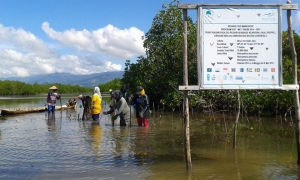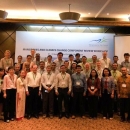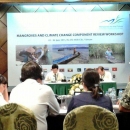Newsroom :: Events :: MFF Mangroves and Climate Change component showcases ways of building community resilience
MFF Mangroves and Climate Change component showcases ways of building community resilience
Location: Ho Chi Minh City, Viet Nam. 1st Jun 2015 to 4th Jun 2015
The mangroves and climate change component embraced the ecosystem-based approach as a key to resilience-building in coastal communities. The main objective of the component was to realise "climate change adaptation benefits and other potential environmental services from mangroves and coastal vegetation in MFF countries of South and Souteast Asia". This was achieved through implementation of specific activities in Bangladesh, Indonesia, and Viet Nam.
Several new methodologies were developed during the process, among them the Resilience Analysis Protocol (RAP), which is a five-step participatory process that helps develop a common understanding on social and environmental issues--including climate change impacts--in communities.The analysis provides information that can assist in decision-making, especially when identifying priorities for funding MFF Grant Facilities. The RAP is now the standard tool that MFF uses to facilitate its grant facility implementation.
An overview of results show that resilience building was the focus of at least 53 small grant projects implemented in the three countries where the component was piloted (Bangladesh, Indonesia and Viet Nam). Country specific methodologies were developed to enhance local governance and benefit sharing mechanisms such as co-management and Payment for Ecosystem Service (PES). The ecosystem-based approach was also the overarching principle for all activities under the mangroves and climate change component.
The workshop covered the following session topics:
| Session Topic | Discussion points |
| Session 1: Resilience building in coastal communities |
|
| Session 2: Special studies on mangrove economic valuation |
|
| Session 3: Special studies on integrated mangrove-aquaculture and livelihoods |
|
| Session 4: Special studies on co-management |
|
| Session 5: Payment for Ecosystem services |
|
| Session 6: Other coastal management strategies and studies |
|
| Session 7: Effective Communications: strategies and experiences |
|
A field trip to Viet Nam project sites in Tra Vinh and Ben Tre was organized on June 3 and 4.


